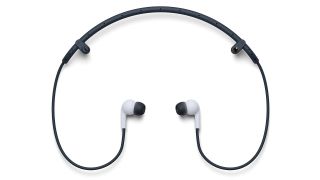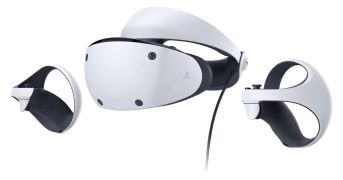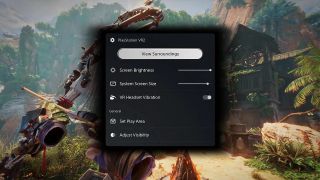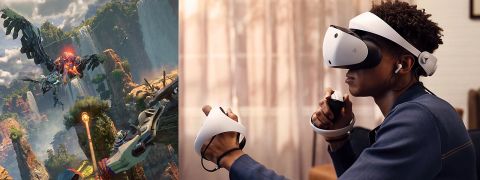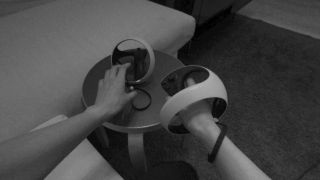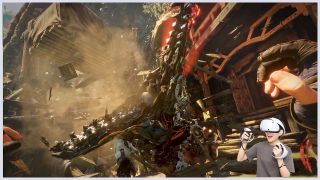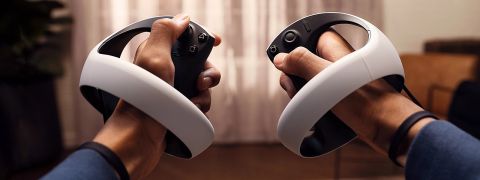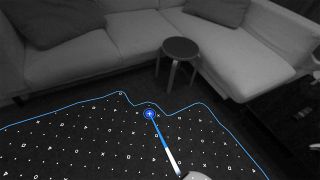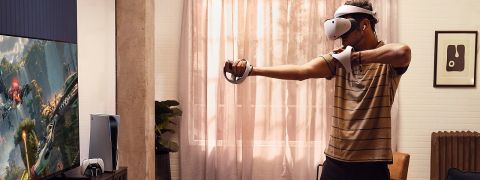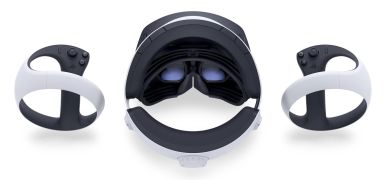PlayStation VR2
| PlayStation VR2 | |
|---|---|
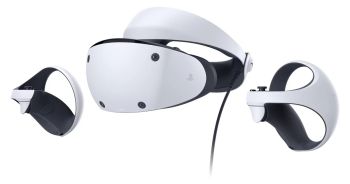
| |
| Basic Info | |
| VR/AR | Virtual Reality |
| Type | Head-mounted display |
| Subtype | Integrated HMD |
| Platform | PlayStation 5 |
| Creator | Sony Interactive Entertainment |
| Developer | Sony Interactive Entertainment |
| Manufacturer | Sony |
| Announcement Date | February 23, 2021 (Initial reveal); January 4, 2022 (Full name/details) |
| Release Date | February 22, 2023 |
| Price | US$549.99 / £529.99 / €599.99 (Launch) (Current price may vary, for example $399 reported) |
| Website | playstation.com/ps-vr2 |
| Versions | Standard, Horizon Call of the Mountain Bundle |
| Requires | PlayStation 5 |
| Predecessor | PlayStation VR |
| System | |
| Operating System | PlayStation 5 system software |
| Chipset | Uses PS5 |
| CPU | Uses PS5 |
| GPU | Uses PS5 |
| Storage | |
| Storage | Uses PS5 |
| Memory | Uses PS5 |
| SD Card Slot | No |
| Display | |
| Display | OLED |
| Subpixel Layout | PenTile Diamond |
| Peak Brightness | Supports HDR |
| Resolution | 2000 x 2040 per eye (4K total) |
| Refresh Rate | 90Hz, 120Hz |
| Image | |
| Field of View | Approx. 110 degrees |
| Visible FoV | 110° diagonal |
| Foveated Rendering | Yes (Eye-tracked) |
| Optics | |
| Optics | Fresnel lenses |
| Ocularity | Binocular |
| IPD Range | 58-73 mm hardware adjustable (manual dial, assisted via eye tracking) |
| Adjustable Diopter | No |
| Passthrough | Yes (Grayscale via tracking cameras) |
| Tracking | |
| Tracking | Inside-out tracking (6DoF) |
| Base Stations | No |
| Eye Tracking | Yes (IR camera per eye) |
| Face Tracking | No |
| Hand Tracking | No (Controller-based finger detection only) |
| Body Tracking | No |
| Rotational Tracking | Yes (Six-axis motion sensing system) |
| Positional Tracking | Yes (via 4 embedded cameras) |
| Update Rate | 90Hz / 120Hz |
| Tracking Volume | Room-scale capable (Recommended 2m x 2m min) |
| Play Space | Room-scale, Standing, Seated |
| Audio | |
| Audio | Stereo headphone jack (Input: Built-in microphone) |
| Microphone | Yes (Built-in) |
| 3.5mm Audio Jack | Yes |
| Camera | 4 embedded tracking cameras, 2 IR eye-tracking cameras |
| Connectivity | |
| Connectivity | USB Type-C (to PS5), Bluetooth 5.1 (Controllers) |
| Ports | USB Type-C (Headset connection), 3.5mm audio jack |
| Wired Video | USB Type-C |
| Wireless Video | No |
| WiFi | No |
| Bluetooth | Yes (Version 5.1 for controllers) |
| Power | Via USB-C from PS5 |
| Battery Capacity | Built-in lithium-ion rechargeable (Controllers) |
| Battery Life | Approx. 4-6.5 hours (Controllers, varies with haptics) |
| Device | |
| Weight | 560g (Headset with strap); 168g (Per Controller) |
| Material | Plastic, Rubber facial interface |
| Headstrap | Hard padded retractable halo strap |
| Haptics | Yes (Headset vibration, Controller haptics, Adaptive Triggers) |
| Color | White / Black |
| Sensors | Headset: Six-axis motion sensing system (gyroscope, accelerometer), IR proximity sensor, 4 tracking cameras, 2 IR eye-tracking cameras Controllers: Six-axis motion sensing system, Capacitive finger touch detection, IR LED position tracking |
| Input | PlayStation VR2 Sense controllers (analog sticks, face buttons, triggers, grip buttons, capacitive sensors), Eye tracking, DualSense (for some games) |
| Cable Length | 4.5m / 14.7 feet |
Property "Tracking" (as page type) with input value "Inside-out tracking]] (6DoF)" contains invalid characters or is incomplete and therefore can cause unexpected results during a query or annotation process. Property "Tracking Volume" (as page type) with input value "Room-scale]] capable (Recommended 2m x 2m min)" contains invalid characters or is incomplete and therefore can cause unexpected results during a query or annotation process. <ul><li>Property "Connectivity" (as page type) with input value "USB Type-C]] (to PS5)" contains invalid characters or is incomplete and therefore can cause unexpected results during a query or annotation process.</li> <!--br--><li>Property "Connectivity" (as page type) with input value "Bluetooth]] 5.1 (Controllers)" contains invalid characters or is incomplete and therefore can cause unexpected results during a query or annotation process.</li></ul> Property "Haptics" (as page type) with input value "Adaptive Triggers]])" contains invalid characters or is incomplete and therefore can cause unexpected results during a query or annotation process. <ul><li>Property "Input" (as page type) with input value "PlayStation VR2 Sense controller]]s (analog sticks" contains invalid characters or is incomplete and therefore can cause unexpected results during a query or annotation process.</li> <!--br--><li>Property "Input" (as page type) with input value "DualSense]] (for some games)" contains invalid characters or is incomplete and therefore can cause unexpected results during a query or annotation process.</li></ul>
The PlayStation VR2 (PS VR2) is a virtual reality headset developed by Sony Interactive Entertainment for the PlayStation 5 (PS5) console. [1] It was released worldwide on February 22, 2023, serving as the successor to the original PlayStation VR headset released in 2016. [2][3] The PS VR2 represents a significant technological leap over its predecessor, incorporating modern VR features like inside-out tracking, high-resolution HDR displays, eye tracking, advanced controller haptics, and foveated rendering. [4][5][3][6] It requires a connection to a PS5 via a single USB Type-C cable to function and is not backward compatible with original PSVR games. [4][3][7]
Hardware
Headset Design & Comfort
The PS VR2 features a design aesthetic similar to the PS5 console and its accessories, primarily in black and white. [4] It utilizes a halo-style headband that distributes weight across the forehead and back of the head, rather than resting heavily on the face, enhancing comfort for extended use. [4][5][8] The headband is adjustable via a rear dial and a button release mechanism, while the visor itself can slide closer to or further from the user's eyes using a scope adjustment button. [4][5][6] The headset weighs approximately 560 grams, making it slightly lighter than the original PS VR (600g) and significantly lighter than competitors like the Valve Index (809g). [3][6][9]
The face mask employs a soft, concertina-style rubber gasket designed to block external light effectively. [6][3] Many reviewers have noted its comfortable fit, even for users wearing glasses, often citing it as one of the most glasses-friendly headsets available due to the wide eyepiece and adjustable visor distance. [10][7][6] The headset connects to the PS5 via a single, non-detachable 4.5-meter (14.7-foot) USB-C cable. [4][7][6] While simplifying setup compared to the original PSVR's complex wiring and breakout box, the tethered nature can sometimes lead to the cable getting tangled or underfoot during room-scale experiences. [10][7][3]
PlayStation VR2 Sense Controllers
A major upgrade from the original PSVR's PlayStation Move wands, the PS VR2 includes two dedicated PlayStation VR2 Sense controllers. [4][5][6] These controllers feature an ergonomic, orb-like design with tracking rings that wrap around the user's wrists. [4][6] Each controller includes an analog stick, two face buttons (Circle/Cross on right, Triangle/Square on left), a grip button (L1/R1), an adaptive trigger (L2/R2), Options/Create buttons, and a PS button. [1][6] Each controller weighs 168g. [9]
The Sense controllers incorporate the advanced haptic feedback and adaptive triggers found in the PS5's DualSense controller, allowing for nuanced vibrations and variable trigger resistance that enhance immersion in games like feeling the tension of a bowstring or the recoil of a weapon. [4][5][8] They also feature capacitive sensors for basic finger touch detection on the analog sticks, face buttons, and triggers, allowing virtual hands to mimic simple gestures like pointing or making a fist, though it's not full finger tracking. [4][5][1] Controller tracking is handled by the headset's cameras via IR LEDs on the controllers' rings. [1] Battery life is rated at approximately 4 to 6.5 hours, depending on haptic intensity, and the controllers are charged via USB-C. [4][3][6][8] An optional charging dock that charges both controllers simultaneously is available separately. [3][7]
Technology & Features
Display & Optics
The PS VR2 utilizes dual OLED panels, providing a resolution of 2000 x 2040 pixels per eye, totaling a 4K resolution. [4][5][1] This is a significant increase from the original PSVR's 960 x 1080 per eye resolution. The displays support HDR for richer colors, higher contrast, and deeper blacks, and operate at selectable refresh rates of 90Hz or 120Hz for smooth motion. [4][1][6] The headset offers an approximate field of view (FoV) of 110 degrees, wider than the original PSVR and comparable to many modern headsets. [4][1][9] It employs Fresnel lenses, which help achieve the wide FoV while keeping weight down. While generally providing a clear image, some users have noted a relatively small "sweet spot" where the image is sharpest, requiring precise headset adjustment to avoid blurriness at the edges. [3] Lens separation (IPD) is manually adjustable via a dial on the headset (ranging from 58mm to 73mm), with the eye-tracking system providing visual feedback to assist the user in finding the optimal setting for clarity. [4][7][9]
Tracking System
Unlike the original PSVR which required an external PlayStation Camera, the PS VR2 uses inside-out tracking. [4][11] Four cameras embedded in the headset track the surrounding environment and the position of the Sense controllers, enabling 6DoF (six degrees of freedom) movement without external sensors. [4][1] This system allows for room-scale play spaces, with Sony recommending a minimum area of 2m x 2m (approx. 6.7ft x 6.7ft) for standing or room-scale experiences, although seated play is also supported. [7][11][8] During setup, the cameras scan the room, creating a 3D mesh of the environment to automatically suggest safe play boundaries (the Guardian system). These boundaries can then be manually adjusted by the user using the Sense controllers. [4][3][7][12] The headset also features a passthrough view, accessible via a dedicated button on the underside of the visor, which displays the real world in grayscale through the tracking cameras. This is useful for locating controllers, checking surroundings, or interacting briefly with the physical environment without removing the headset. [4][3][11][8]
Eye Tracking & Foveated Rendering
A key technological advancement in the PS VR2 is its integrated eye tracking, implemented via infrared cameras inside the headset monitoring each eye. [4][10][1] This enables foveated rendering, a rendering optimization technique where the headset renders the exact area the user is looking at in full, sharp resolution, while dynamically lowering the resolution of the peripheral areas outside the user's gaze. [4][3][7] This significantly reduces the processing load on the PS5's GPU, allowing developers to achieve higher overall graphical fidelity and performance without a noticeable impact on the user's perceived visual quality, as the human eye only sees sharp detail in its central focus area. [4][10][8] Eye tracking is also utilized for gameplay mechanics and user interface interactions in some titles, such as allowing players to select menu options by looking at them or enabling unique interactions like aiming weapons or having game characters react to the player's gaze. [4][5][7][8]
Haptics
The PS VR2 ecosystem features multiple layers of haptic feedback designed to increase immersion. [4] The Sense controllers provide detailed vibrations capable of simulating various textures and impacts, and utilize adaptive triggers for realistic resistance feedback during actions like pulling a trigger or drawing a bow. [4][6][8] Uniquely, the headset itself includes a single vibration motor located in the headband, adding another layer of physical sensation by providing feedback directly to the user's head during impactful in-game moments, such as explosions, large creature footsteps, or sudden impacts. [4][10][7][1]
Audio
Audio is delivered via a standard 3.5mm audio jack located on the back of the headband. [1][6] Sony includes a pair of simple stereo earbuds specifically designed to attach neatly to integrated holders on the headband, minimizing dangling wires. [5][6][3] Users can plug in their own headphones, although the headband design might interfere with some larger over-ear models. [5][6] The headset supports the PS5's Tempest 3D AudioTech engine for immersive spatial audio, allowing sounds to be accurately positioned around the player based on their head orientation. [6][13] It is also compatible with Sony's Pulse 3D Wireless Headset (via USB dongle connected to the PS5). [4][7] A built-in microphone array allows for voice chat and commands within games and the PS5 system. [1] Unlike the revised original PSVR model, the PS VR2 lacks physical volume control buttons on the headset itself; volume must be adjusted through the PS5's quick menu or system settings. [8][5]
Setup & User Experience
Setting up the PS VR2 is significantly streamlined compared to its predecessor. [4][5][6] It connects to the PlayStation 5 via a single USB-C cable plugged into the front port, eliminating the need for the breakout box and multiple HDMI cables of the original PSVR. [4][3][7] The PS5 automatically detects the headset upon connection and guides the user through a brief on-screen initial setup process. This includes pairing the Sense controllers (which requires connecting them via USB initially), calibrating eye tracking by following on-screen prompts, adjusting the IPD dial using visual feedback, and defining the play area by scanning the room with the passthrough cameras and customizing the automatically generated boundaries. [4][3][6][8] The headset integrates seamlessly with the PS5 dashboard, displaying the standard system menu within the virtual view when the headset is active. [4][6]
The PS VR2 also offers a Cinematic Mode which allows users to play non-VR PS5 and PS4 games, watch movies, or use media apps on a large virtual screen projected within the headset. [3][7][6] This mode supports HDR and up to 120Hz playback for compatible content, but outputs at a maximum resolution of 1920x1080 (1080p). [3][7][13] Users need to use a standard DualSense controller to play non-VR games in this mode. [7]
Software & Games
Launch Library
The PS VR2 launched with over 30 titles, a mix of new games, ports from other VR platforms, and VR modes for existing PS5 games. [8][6] Key launch titles included the exclusive Horizon Call of the Mountain, a visually impressive adventure game designed to showcase the headset's capabilities, and free VR updates for major PS5 releases like Gran Turismo 7 and Resident Evil Village. [2][10][6] Other notable games available at or near launch included ports of popular VR titles like Moss and Moss: Book II, Star Wars: Tales from the Galaxy's Edge (Enhanced Edition), Rez Infinite, Tetris Effect: Connected, Kayak VR: Mirage, Pistol Whip, Pavlov VR, No Man's Sky (VR update), and Demeo. [2][14][10][6][8]
Lack of Backward Compatibility
A significant point of criticism is that the PS VR2 is not backward compatible with games designed for the original PlayStation VR. [5][3][7][6] Sony stated that the fundamental differences in tracking technology (inside-out vs. external camera), controller input (Sense vs. Move/DualShock 4), and features like eye tracking necessitated a different development approach, preventing direct compatibility. [6][13] While some developers have released ports or upgrades of their original PSVR games for PS VR2 (sometimes offered for free or at a discount to existing owners), the extensive library of the original headset remains inaccessible on the new hardware unless specifically updated by the developer. [4][7][8]
Content Concerns & Future Developments
Despite a technically strong launch, ongoing concerns have been raised regarding the breadth and depth of the PS VR2 software library, particularly the perceived lack of consistent, high-budget first-party exclusive titles beyond the initial launch window. [2][15] Many available games are ports from other VR platforms like Meta Quest or PC VR, leading some reviewers and users to question Sony's long-term commitment to funding major, system-selling exclusives specifically for the platform. [2][3][10] Events such as layoffs at Sony's VR-focused studios (including the closure of London Studio, developer of PSVR's Blood & Truth) and reports of paused production in early 2024 due to unsold inventory further fueled these concerns. [15] However, Sony has stated over 100 games were in development[3], and the platform continues to receive ports of popular indie and third-party VR titles, such as Metro Awakening and Alien: Rogue Incursion.[15]
In February 2024, Sony announced it was testing official PC support for the PS VR2.[13] This feature launched on August 7, 2024, requiring a separately sold PC adapter ($59.99). This allows PS VR2 owners to access the SteamVR library on compatible PCs. However, certain PS VR2 features like HDR, eye tracking, adaptive triggers, and headset haptics are not supported when used on PC.[13] Reports in December 2024 also suggested Sony was in talks with Apple regarding potential compatibility of the Sense controllers with the Apple Vision Pro.[13]
Reception & Sales
The PlayStation VR2 received generally positive reviews upon launch, with critics widely praising it as a significant technological advancement over the original PSVR and a high-quality, immersive VR system for the PS5. [4][5][11][6] The high-resolution OLED HDR display, comfortable and glasses-friendly design, advanced Sense controllers with adaptive triggers and haptics, reliable inside-out tracking, and the innovative inclusion of eye tracking with foveated rendering were frequently highlighted as major strengths. [4][5][10][7][6] The simplified setup process using a single cable was also seen as a vast improvement over the original. [4][5][3] It was often lauded as offering a premium VR experience comparable to high-end PC VR, but with the convenience of a console ecosystem. [4][6][8]
However, the high launch price of $549.99, costing more than the PS5 console itself, was a common and significant point of concern, potentially limiting its mainstream appeal compared to more affordable standalone options like the Meta Quest 2/Meta Quest 3. [5][3][11][7] The lack of backward compatibility with the large library of original PSVR games and ongoing questions about the strength, frequency, and exclusivity of its future software library were also significant criticisms. [2][5][3][7]
Sales figures indicated a strong start, with Sony reporting nearly 600,000 units sold in the first six weeks.[13] However, subsequent reports suggested demand slowed, leading to the temporary production pause in early 2024.[13][15] Former Sony executive Shuhei Yoshida expressed some disappointment in a December 2024 interview, stating he was "wrong" about PS VR2 becoming the "PS2" of VR, implying it hadn't met high market expectations, though he praised titles like Synapse and Before Your Eyes. [15] Temporary price drops to $350 during holiday sales reportedly led to significant increases in sales velocity, suggesting high price sensitivity among potential buyers. [15]
Review Scores
| Publication | Score |
|---|---|
| IGN | 9/10[4] |
| Wired | 8/10[5] |
| The Verge | 7/10[3] |
| CNET | 8.0/10[7] |
| PCMag | 4.5/5 (Outstanding)[6] |
| T3 | 4/5[11] |
| UploadVR | Recommended[8] |
| PC Gamer | 88/100[12] |
Images
See Also
- Virtual reality headset
- List of PlayStation VR games
- List of PlayStation VR2 games
- Meta Quest 2 / Meta Quest 3
- Valve Index
- Comparison of virtual reality headsets
References
- ↑ 1.00 1.01 1.02 1.03 1.04 1.05 1.06 1.07 1.08 1.09 1.10 1.11 PlayStation VR2 tech specs. PlayStation.com. Accessed December 16, 2024.
- ↑ 2.0 2.1 2.2 2.3 2.4 2.5 PSVR 2 one year later — here’s the good and the bad after 12 months. Tom's Guide. Published February 22, 2024.
- ↑ 3.00 3.01 3.02 3.03 3.04 3.05 3.06 3.07 3.08 3.09 3.10 3.11 3.12 3.13 3.14 3.15 3.16 3.17 3.18 3.19 3.20 3.21 3.22 3.23 PSVR 2 review: love on a leash. The Verge. Published February 16, 2023.
- ↑ 4.00 4.01 4.02 4.03 4.04 4.05 4.06 4.07 4.08 4.09 4.10 4.11 4.12 4.13 4.14 4.15 4.16 4.17 4.18 4.19 4.20 4.21 4.22 4.23 4.24 4.25 4.26 4.27 4.28 4.29 4.30 4.31 4.32 4.33 4.34 4.35 4.36 PlayStation VR2 Review. IGN. Updated September 13, 2024.
- ↑ 5.00 5.01 5.02 5.03 5.04 5.05 5.06 5.07 5.08 5.09 5.10 5.11 5.12 5.13 5.14 5.15 5.16 5.17 5.18 Review: Sony PSVR 2. Wired. Published February 16, 2023.
- ↑ 6.00 6.01 6.02 6.03 6.04 6.05 6.06 6.07 6.08 6.09 6.10 6.11 6.12 6.13 6.14 6.15 6.16 6.17 6.18 6.19 6.20 6.21 6.22 6.23 6.24 6.25 6.26 6.27 6.28 Sony PlayStation VR2 Review. PCMag. Published February 16, 2023.
- ↑ 7.00 7.01 7.02 7.03 7.04 7.05 7.06 7.07 7.08 7.09 7.10 7.11 7.12 7.13 7.14 7.15 7.16 7.17 7.18 7.19 7.20 7.21 PSVR 2 Review: The Best VR Gaming Experience With Strings Attached. CNET. Updated February 23, 2023.
- ↑ 8.00 8.01 8.02 8.03 8.04 8.05 8.06 8.07 8.08 8.09 8.10 8.11 8.12 8.13 8.14 PlayStation VR2 Review: Next-Generation VR Gaming For PS5. UploadVR. Published February 16, 2023.
- ↑ 9.0 9.1 9.2 9.3 PlayStation VR2 Specs. VR Compare. Accessed December 16, 2024.
- ↑ 10.0 10.1 10.2 10.3 10.4 10.5 10.6 10.7 10.8 'PlayStation VR2' Review: A strong foundation with a questionable future. NPR. Published February 21, 2023.
- ↑ 11.0 11.1 11.2 11.3 11.4 11.5 PSVR2 review: is Sony PlayStation VR2 the best virtual reality ever?. T3. Published February 16, 2023.
- ↑ 12.0 12.1 Sony PS VR2 Review. PC Gamer. Published March 17, 2023.
- ↑ 13.0 13.1 13.2 13.3 13.4 13.5 13.6 13.7 PlayStation VR2. Wikipedia. Accessed December 16, 2024.
- ↑ Cite error: Invalid
<ref>tag; no text was provided for refs namedtheverge - ↑ 15.0 15.1 15.2 15.3 15.4 15.5 Sony's Shuhei Yoshida: "I'm Sorry I Was Wrong" About PlayStation VR2. UploadVR. Published December 13, 2024.


